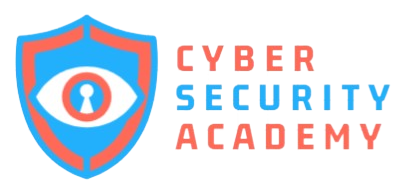SOC Analyst Training In Hyderabad
- Expert SOC Trainer with 13+ years Experience
- Lifetime access to our LMS, materials and recorded
- Affordable Fees with EMI Options
- Interactive live sessions with our trainers
- Free Interview preparation Sessions


3.5 K+
Happy Students
30 +
Video Ready Materials
50 +
Real Projects Finished
Table of Contents
ToggleNext batch Details
SOC Analyst Curriculum
Course Topics
Introduction to Cyber Security
● Introduction to Cyber Security Roles and Responsibilities.
● Careers in Cyber security Basic
● terminologies Elements of Information Security(CIA-Triad), Non-repudiation, Authenticity
Motives, Goals, and objectives of Information
● Security Attacks Types of Hackers
● Information Security Threat Categories.
● Cyber Kill Chain Penetration Testing and Methodologies (PTES standard, Red teaming,
Blue teaming)
● Cyber Security Standards(ISO 27000 family, PCI DSS, Card holder data)
Labs: Social Engineering Phishing Phisher
Fundamentals of Networking
● Network devices
● Internet Protocol NAT and PAT
● Understanding the OSI layer
● Overview of TCP/IP Model
● TCP and UDP
● Protocols and Ports
● Packet Tracer
● Wireshark
● Virtualization and cloud-computing
● CIS Benchmarking
● Microsoft Server
● Introduction to Server
● Types of Physical Server
● Installation of Client and Server and Best practices
● Common Server Roles and Configuration
● RAID levels
Labs :
OSPF Routing EIGRP Routing ACL configuration Switch configuration VLAN configuration
VLAN Trunking Protoco
Kali-Installation-Configuration (Manual Partition )
● Introduction to Linux
● Linux vs Windows
● Linux fundamentals
● Basic Commands
● User Management -Permission-Process
● File System-Boot Process
● Linux booting process
● Kernel
Scanning
● Attacks on Cyber Security
● Hacking Phases
● OSINT tools
● VPN & TOR
● Cryptography Information
● Gathering Techniques
● Scanning -Tools -Nmap
● Metasploit Framework
● Brute Force Attacks
● Enumeration
● Exploitation Vulnerable machines from Pentest Garage
● Privilege Escalation-Boot to Root
Web Application Security
● HTTP Request and Response
● BurpSuite 101
● Owasp Top 10 Vulnerabilities
Introduction to Network Security
● The Confidentiality, Integrity and Availability (CIA)
● IDS and IPS
● Firewall and Types
● AAA Security Honeypot
● Identity and Privilege Access Management
● Principles of Least privilege
● Vulnerability Management
● Data Leak Prevention
● Malware
Understanding the Role of Security Operations
● Security Operations Center (SOC) Overview
● Security Incident Management Basics
● Incident Categorization and Severity
● Incident Reporting and Escalation Procedures
● Introduction to Security Monitoring and Logging
Lab 1: Cybersecurity Basics Hands-On
● Identifying common security threats and vulnerabilities.
● Configuring basic security controls on a virtual environment.
● Analyzing security logs and event data.
Common Cyber Threats and Attack Vectors
● Phishing and Social Engineering Attacks
● Malware and Ransomware Overview
● Web Application Vulnerabilities and Attacks
● Network-Based Attacks (e.g., DoS, DDoS)
● Insider Threats and Mitigation Strategies
Security Information and Event Management (SIEM) Fundamentals
● SIEM Configuration and Log Collection
● SIEM Rule Creation and Use Cases
● Real-Time Monitoring and Alerting
● Analyzing SIEM Reports and Dashboards
● Integrating Threat Intelligence with SIEM
Lab 2: SIEM Configuration and Alerting
● Setting up a virtual SIEM environment.
● Configuring log sources and collecting logs.
● Creating custom SIEM rules and alerts for specific scenarios.
Incident Response Lifecycle and Phases
● Incident Triage and Analysis Techniques
● Incident Containment and Eradication
● Incident Response Tools and Technologies
● Post-Incident Activities and Reporting
● Legal and Ethical Considerations in Incident Response
Lab 3: Incident Response Simulation
● Simulating a real-world incident response scenario.
● Conducting incident triage and analysis.
● Implementing containment and eradication strategies
Introduction to Threat Intelligence
● Types of Threat Intelligence (Strategic, Tactical, Technical)
● Leveraging Threat Intelligence for Incident Response
● Proactive Threat Hunting Strategies
● Threat Hunting Tools and Techniques
● Collaborative Threat Intelligence Sharing
Lab 4: Threat Hunting and Intelligence Analysis
● Using threat intelligence feeds to identify potential threats.
● Performing threat hunting exercises on network data.
● Collaborating with other analysts to share threat intelligence.
Advanced Persistent Threats (APTs) and Nation-State Actors
● Insider Threats and Advanced Social Engineering Techniques
● Fileless and Memory-Based Attacks
● Advanced Malware Analysis and Reverse Engineering
● Exploit Development and Vulnerability Research
Lab 5: Malware Analysis and Exploit Development
● Analyzing advanced malware samples in a controlled environment.
● Reverse engineering malicious code and understanding its behavior.
● Developing and testing exploits for known vulnerabilities
Designing and Implementing a Security Operations Center
● SOC Operational Models and Maturity Levels
● Incident Response Team Development and Management
● Security Governance, Risk, and Compliance (GRC)
● SOC Metrics, Reporting, and Performance Measurement
Lab 6: SOC Management Simulation
● Building and managing a simulated SOC environment.
● Developing incident response playbooks and procedures.
● Reporting on SOC performance metrics and KPIs
The Role of Automation and Orchestration in SOC
● Implementing Playbooks and Automated Response
● Integrating Security Tools and Orchestration Platforms
● Workflow Optimization and Efficiency in Incident Response
● Challenges and Considerations for SOC Automation
Lab 7: Security Automation and Orchestration
● Creating and executing automated incident response playbooks.
● Integrating security tools with an orchestration platform.
● Optimizing incident response workflows through automation.
Introduction to splunk
● Working and Architecture of Splunk
● Splunk Enterprise Installation
● Indexing Data into Splunk
● Splunk Forwarder Installation
● How splunk indexes data
● Searching with Splunk
● Visualizing Data
● Creating Alert
● Splunk Report
● Log Creating using USE CASE
Labs : Splunk Enterprise, Splunk Universal Forwarder, Searching with Splunk, Integration
Alerting and Reporting, Regular Expression, Use Case Creation
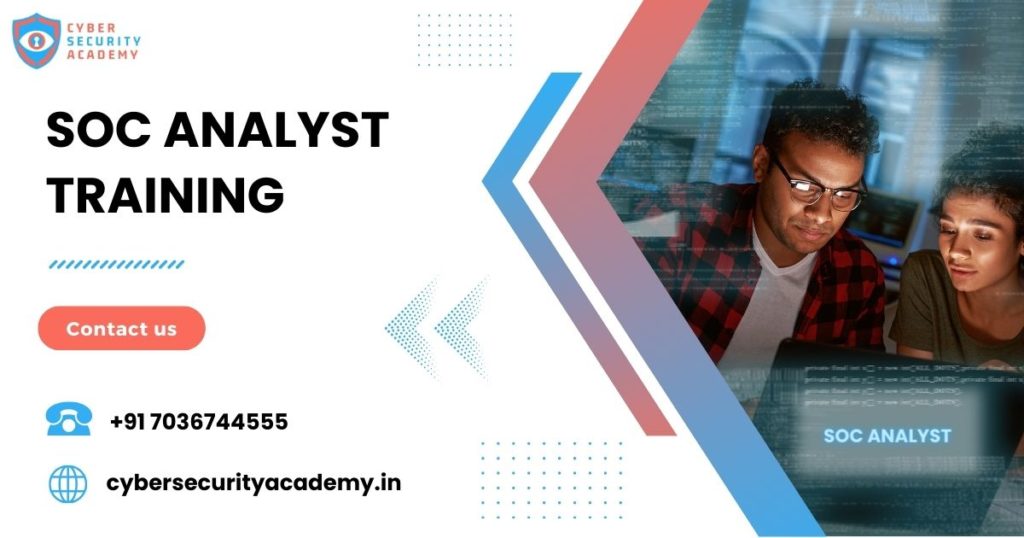
SOC Analyst Training In Hyderabad
Key Points

Real Time Expert Trainers
Learn how to be really good at analyzing security issues on computers by getting help from teachers who have been doing it for more than 5 years.

Project Scenarios Explained
Use what you've learned in class to solve real problems on computers. This will help you feel ready to start working in the computer job world because you'll have actual experience.

Flexible Learning Options
You can pick how you want to learn, like taking online classes with a teacher, going to a classroom, or watching videos at your own speed. This way, you can learn in a way that works best for you and fits your schedule.

Industry Ready Curriculum
Our courses for SOC Analysts are carefully designed to match what the industry needs. This means you'll learn exactly what you need to know and be able to do when working as a SOC Analyst.

Interactive Doubt Sessions
Join live sessions where experienced trainers will answer your questions, creating an active and interactive learning atmosphere that's designed just for you.

Interview & Job Support
Get help finding a job as a SOC Analyst, including creating a good resume and preparing for interviews. This will increase your chances of getting hired in the SOC Analyst field.

Community Driven Learning
Join a group where you can learn together with other people. You can share ideas, talk about what you've learned, and help each other out. This creates a supportive community where everyone can contribute and grow together.

Making You Job Ready
Our training is all about giving you the skills and knowledge that employers are looking for. This way, you'll be ready to handle the demands of the job market and work effectively as a skilled SOC Analyst.

Flexible Learning Sessions
Take advantage of flexible learning schedules that let you manage your work or personal life while still learning about SOC Analyst techniques. You can learn at a pace that works best for you.
What is SOC?
- Centralized Security Hub: A SOC, which stands for Security Operations Center, is a central place or group that keeps an eye on, finds, looks into, and deals with cyber security problems and dangers immediately.
- Threat Analysis: SOC analysts examine security events and incidents to figure out what they are, how big they are, and what they might do to the organization's stuff, like data and operations.
- Continuous Monitoring: The SOC works all day and night, checking different security systems, networks, and devices using special tools and technology to keep the organization safe from cyber threats.
- Incident Response: The SOC organizes actions to deal with security incidents, such as stopping them from spreading, getting rid of them, and getting things back to normal. They work with the right people to make sure the impact is as small as possible.
- Incident Detection: The SOC's job is to find out if anything bad is happening on the organization's computers, like someone trying to get in without permission, viruses getting in, data being stolen, or anything else that seems weird or wrong.
- SIEM Integration: The SOC uses a special system called SIEM to gather, connect, and study security data from different places. This helps them find and deal with threats before they become big problems.
SOC Analyst Training In Hyderabad
Objective
The SOC course aims to equip students with the fundamental skills and knowledge required to work effectively as Security Operations Center (SOC) Analysts. Through this course, students will learn how to monitor, detect, analyze, and respond to cyber security incidents and threats in real-time.
In this course, you’ll learn how to analyze security events, coordinate responses to incidents, detect threats using special tools, and work with clients. By the end, you’ll be good at spotting and reducing security risks to keep organizations safe.

- Learn to monitor and analyze security events.
- Understand incident response coordination.
- Gain proficiency in threat detection using specialized tools.
- Collaborate effectively with stakeholders.
- Identify and reduce security risks.
- Ensure the security posture of organizations.
Course Overview
The SOC Analyst Training helps students learn all they need to know to do well in cyber security and working in a Security Operations Center (SOC). This training covers many things like the basics of cyber security, how to detect and handle incidents, understanding threats, managing logs, following rules, and learning about new technologies.
In the training, you’ll learn what a SOC Analyst does, how a SOC is set up, what to do during incidents, ways to search for threats, and what rules to follow. The training includes doing things yourself, dealing with real situations, and working on projects to get practical experience with SOC work.
After finishing the training, you’ll be ready to apply for jobs as a SOC Analyst Course in Hyderabad or other places. You’ll help make organizations more secure in different industries.

Course Outline

Introduction to Security Operations Center (SOC) and its importance in cyber security

Overview of SOC architecture, components, and operational capabilities

Introduction to cyber security concepts, threats, and attack vectors relevant to SOC operations

The SOC life cycle and how it is implemented to detect, analyze, and respond to security incidents

An overview of SOC frameworks and methodologies, such as the cyber kill chain and MITRE ATT&CK framework

How SOC utilizes tools and technologies, including SIEM, IDS/IPS, firewalls, and threat intelligence feeds, to manage and monitor security events

Incident detection and response processes within SOC, including incident triage, prioritization, containment, eradication, and recovery

Threat hunting and anomaly detection techniques used in SOC operations to proactively identify and mitigate security threats

Log management and analysis in SOC, including log collection, aggregation, correlation, and reporting of security events

Incident handling and forensics procedures within SOC, including evidence collection, preservation, and forensic analysis

SOC operational models, workflows, and incident escalation processes for effective incident management

Compliance requirements and regulations applicable to SOC operations, such as GDPR, HIPAA, NIST, and industry-specific standards
Pre-requisites
- Basic understanding of computer networks and operating systems.
- Familiarity with programming languages like Python or C/C++.
- Knowledge of cyber security fundamentals and common terminology.
- Strong analytical and problem-solving skills.
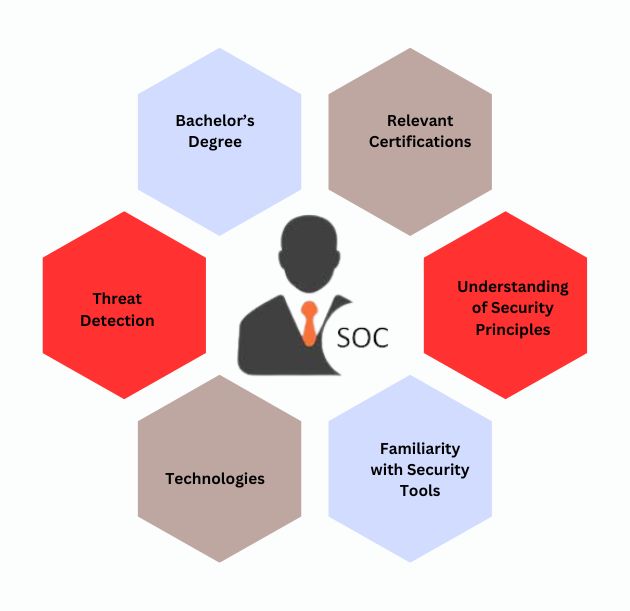
Mode Of Training
Online Training
- Comprehensive Curriculum
- Daily Recorded Videos
- Live Project Included
- 100% Placement Assistance
- Interview Guidance
- Enroll for Free Demo
Self Paced Videos
- Extensive Content Coverage
- Daily Recorded Sessions
- Live Project Integration
- Guaranteed Placement Support
- Tailored Interview Prep
- Free Demo Enrollment.
Corporate Training
- Customized Curriculum
- Daily Recorded Sessions
- Live Project Engagement
- Placement Assistance
- Interview Preparation
- Free Demo Session
Placement Opportunities for SOC
Start a great career in cyber security with our Best SOC Analyst Training in Hyderabad. This course will teach you everything you need to know to do well in the exciting world of Security Operations Center (SOC) operations.
In this training, you’ll learn the basics of cyber security, how to find and handle incidents, and how to use advanced tools in a SOC. Our experts will guide you through practical projects and real situations so you can be ready for SOC Analyst jobs in Hyderabad and other places.
If you’re interested in cyber security and want to start a career or if you’re already working and want to move up, our SOC Analyst training is perfect for you. Come join us and start your journey to becoming a top SOC Analyst in Hyderabad.
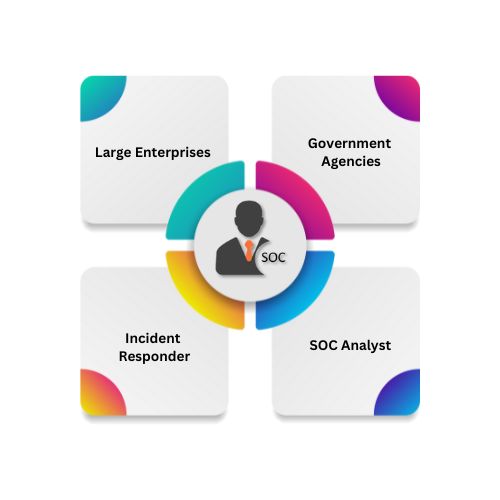
- Security Analyst
- SOC Analyst
- Security Engineer
- Incident Responder
- Threat Intelligence Analyst
- Security Operations Manager
Career Opportunities

Security Operations Center (SOC) Manager/Director
The leadership role involves managing everything in the SOC, like leading the team, responding to incidents, integrating tools, and planning strategies to make the organization's security better.

Threat Intelligence Manager/Analyst
This role is all about gathering, studying, and sharing threat intelligence to spot new threats, understand risks, and help the SOC make smart security choices.

Cyber security Incident Response Manager/Analyst
Leads teams that handle security incidents by investigating them, coordinating responses, and fixing problems to reduce risks and make sure the impact is small.

Security Operations Center (SOC) Engineer
Works closely with SOC analysts to create, set up, and keep secure systems and tools like SIEM platforms, IDS/IPS solutions, firewalls, and endpoint protection technologies.

Security Information and Event Management (SIEM) Engineer/Administrator
This specialized role is all about setting up, handling, and improving SIEM platforms. These platforms gather, connect, and study security data, helping the SOC find and deal with threats before they become big problems.

Cyber Threat Hunter
Actively looks for signs of cyber threats and signs that something is wrong in the organization's networks and systems. They use advanced techniques, tools, and methods to find and stop potential threats before they become serious.

Digital Forensics Analyst
Looks into digital clues after security problems, like data breaches or cyberattacks, to gather, keep safe, and study digital proof. This helps with responding to incidents and legal matters in the SOC.

Security Operations Center (SOC) Consultant
Gives advice to organizations about how to set up, improve, and make the most of their SOC. This includes checking how things are set up, finding gaps, and figuring out how mature the SOC is to make it better and more effective.

Cyber Security Trainer/Instructor
Runs training programs and workshops for SOC staff on how to do their job, the best practices in cyber security, what to do during incidents, and new threats to be aware of. This helps SOC staff get better at their work and learn more about cyber security.

Security Analyst (Threat Researcher)
Does thorough research and study on new cyber threats, weaknesses in systems, and ways attackers are trying to break in. They create reports and give advice based on this information to help the SOC find and stop threats more effectively.
Benefits of the Course
Enhanced Cyber security Skills: Ethical hacking The training helps people learn how to find and fix weaknesses in cyber security. This makes an organization’s defenses stronger against cyber threats.
Upon completion of the course, you’ll be well-prepared for SOC Analyst roles, with the knowledge, skills, and confidence needed to excel in the cyber security field.
The course may prepare you for industry-recognized certifications such as CompTIA Security+, Certified Information Systems Security Professional (CISSP), or Certified SOC Analyst (CSA), boosting your credentials and career opportunities.
The SOC course at Cyber Security Academy provides a deep understanding of Security Operations Center (SOC) operations, covering topics like cyber security fundamentals, incident response, threat intelligence, and more.
The course includes practical projects and hands-on experience with SOC tools and technologies, giving you real-world skills that are valuable in the cyber security industry.
You’ll gain proficiency in using specialized SOC tools such as Security Information and Event Management (SIEM) platforms, Intrusion Detection Systems (IDS), Incident Response (IR) tools, and other cyber security technologies commonly used in SOC operations.
Who Should Learn the course?
- People working in IT who want to specialize in cyber security and protect their organization's digital assets should learn SOC courses.
- Anyone interested in learning about cyber security threats and how to prevent them can benefit from SOC courses.
- Individuals looking to transition into cyber security careers and work in roles like SOC Analysts should consider learning SOC courses.
- Business owners and managers who want to understand cyber security better and protect their company's data should learn SOC concepts.
- Students pursuing degrees or certifications in cyber security or IT-related fields can gain valuable knowledge and skills from SOC courses.
- Network administrators who want to expand their expertise and play a role in securing network infrastructures should consider learning SOC concepts.
Certifications – SOC Analyst Training
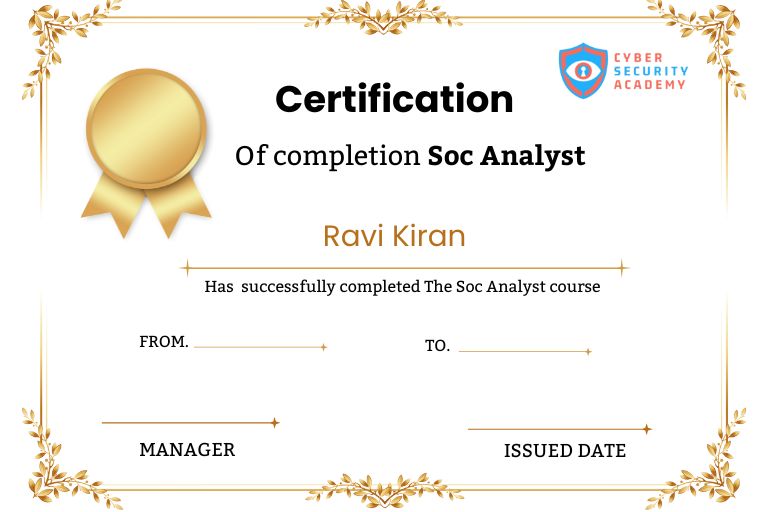
Certifications
- CompTIA Security+
- Certified Information Systems Security Professional (CISSP)
- GIAC Security Essentials (GSEC)
- Certified Incident Handler (GCIH)
- Certified SOC Analyst (CSA)
- Certified SOC Manager (CSM)
- Cisco Certified CyberOps Associate
Embark on a rewarding career journey in cyber security with SOC Analyst Get trained in Hyderabad to become great at Security Operations Center (SOC) jobs. Our training program covers everything you need to know, with hands-on experience, real projects, and expert help, so you’re ready for SOC Analyst jobs in Hyderabad and other places.
Getting a SOC certification means you have proven skills in cyber security, especially in Security Operations Centers. These certifications show that you know how to find and stop cyber threats, handle incidents, and use SOC tools. Employers like seeing these certifications because they know you’re trained and ready to protect their data and systems from hackers.
Some popular SOC certifications are CompTIA Security+, Certified Information Systems Security Professional (CISSP), and Certified SOC Analyst (CSA). These certifications are recognized in the cyber security industry and can help you stand out when applying for jobs. They prove that you have the knowledge and skills to work effectively in SOC environments and deal with cyber threats.
Skills Developed After the course
- Analytical Thinking: SOC training helps improve thinking skills so people can analyze security events well, find patterns, and spot weird things that could be security threats.
- Problem-Solving: SOC analysts get good at solving problems by doing hands-on work, like finding and responding to security incidents, figuring out what went wrong, and fixing things to make them better.
- Attention to Detail: SOC training teaches how important it is to pay close attention to details when looking at security data, investigating incidents, and writing down what you find accurately. This is crucial for following rules and reporting.
- Communication Skills: SOC analysts need to be good at talking to both technical and non-technical people, explaining complicated stuff in a simple way. They also work well with different teams and write clear and short reports about incidents.
- Time Management: SOC training teaches how to manage time well, which means figuring out what to do first, handling tasks efficiently, and reacting quickly to security issues to reduce their impact.
- Collaboration: SOC analysts get better at working together by sharing what they know, working with different teams like IT, network engineers, legal, and managers when responding to incidents.
- Adaptability: SOC training helps people become adaptable so they can quickly adjust to new cyber security threats, use new technologies, and respond to changing priorities in the ever-changing SOC environment.
- Critical Thinking: SOC analysts learn to think carefully about security events, decide how serious incidents are, and make smart choices even when things are stressful. This helps them reduce security risks effectively.
SOC Analyst Training In Hyderabad
Testimonials






Market Trend In SOC Analyst Training
SOC Analyst holds a 41.37% market share overall

Growing Demand
The demand for SOC services is steadily increasing as organizations prioritize cyber security to protect against evolving threats such as ransomware, data breaches, and insider attacks.

Market Size
As of 2022, the global SOC market is valued at over $10 billion and is projected to continue growing at a compound annual growth rate (CAGR) of over 10% in the coming years.

Increased Investments
Organizations are investing heavily in SOC capabilities, including advanced threat detection technologies, security analytics, and incident response tools, to enhance their cyber resilience and reduce security risks.

Regulatory Compliance
Compliance requirements such as GDPR, CCPA, and industry-specific regulations are driving organizations to establish or enhance their SOC capabilities to ensure compliance, leading to increased demand for SOC services.

Rise in Cyber Threats
More and more complicated cyber threats, like ransomware and supply chain attacks, are making companies take cyber security seriously. They're investing in Security Operations Centers (SOCs) to find and stop threats before they cause damage.

Cloud Security
With the adoption of cloud services and hybrid IT infrastructures, organizations are focusing on securing their cloud environments, leading to the integration of cloud security monitoring and management into SOC operations.
Why Choose CSA For SOC Analyst Training
Practical Project Work
Cyber Security integrates practical project work into its Ethical Hacking training, enabling students to apply their skills in real-world scenarios.
Experienced Instructors
Cyber Security Academy has knowledgeable and experienced instructors who can teach you all about SOC operations.
Comprehensive Curriculum
The course covers everything you need to know about being a SOC Analyst, from basic concepts to advanced strategies.
Hands-On Training
You'll get to practice using real SOC tools and technologies, which is crucial for learning how to work in a SOC environment.
Industry Recognition
Certifications from Cyber Security Academy are well-regarded in the cyber security industry, which can boost your career prospects.
Job Placement Assistance
CSA offer job placement assistance, helping you find employment as a SOC Analyst after completing the course.
Group Discussion
Cyber Security facilitates live group discussion sessions, allowing students to engage with peers and trainers, share experiences, and discuss SOC tools and technologies.
Supportive Environment
CSA offers support and guidance throughout the course, ensuring that you understand the material and can succeed in your studies.
Frequently Asked Questions
FAQ
SOC Analyst training in Hyderabad provides comprehensive education and hands-on experience in cyber security, incident response, and threat detection, preparing individuals for rewarding careers in SOC operations.
Hyderabad offers abundant job opportunities for SOC Analysts, with a growing number of organizations seeking skilled professionals to strengthen their cybersecurity defenses and protect against evolving threats.
To become a SOC Analyst in Hyderabad, individuals typically need to complete SOC Analyst training courses, gain relevant certifications, such as CompTIA Security+ or Certified SOC Analyst (CSA), and acquire practical experience through internships or entry-level positions in cybersecurity.
The cost of SOC Analyst certification in Hyderabad varies depending on the certification program and training provider. However, it is generally affordable and offers a high return on investment in terms of career advancement and earning potential.
The salary of a SOC Analyst in India varies depending on factors such as experience, skills, certifications, and the organization’s size and location. However, the average salary for SOC Analysts in India ranges from INR 3.5 to 8 lakhs per annum, with higher salaries for experienced professionals.
Yes, there are entry-level SOC Analyst jobs available for freshers in Hyderabad, with many organizations offering training programs, internships, and junior positions to individuals looking to start their careers in cybersecurity.
Some of the top SOC Analyst training courses available in Hyderabad include comprehensive programs that cover cybersecurity fundamentals, incident response, threat detection, and SOC operations, preparing individuals for successful careers in the field.
SOC Analyst jobs play a crucial role in enhancing cyber security in Hyderabad by monitoring networks and systems for security incidents, analyzing threats, and responding to security breaches to protect organizations’ digital assets and sensitive information.
To excel as a SOC Analyst in Hyderabad, individuals need a strong understanding of cybersecurity principles, analytical skills, attention to detail, proficiency in security tools and technologies, and the ability to communicate effectively with cross-functional teams.
SOC Analysts in Hyderabad have many opportunities for career growth, including advancement to senior analyst roles, specialization in specific areas of cybersecurity, leadership positions in SOC management, and opportunities to transition into related fields such as threat intelligence or security consulting.
